31 july 2015

The Israeli occupation army issued orders to demolish a water tank belonging to a UN-funded agricultural project and to freeze the project in al-Karda village, north of the Jordan Valley.
Local sources reported that Israeli soldiers handed those in charge of the project a written order threatening to demolish a tank used for irrigation and ordering them to halt the whole project at the pretext it is located in the Israel-controlled area C.
The UN Development Programme had provided the Karda villagers with a tank to store water as part of a project to develop the agricultural activities in their village.
Local sources reported that Israeli soldiers handed those in charge of the project a written order threatening to demolish a tank used for irrigation and ordering them to halt the whole project at the pretext it is located in the Israel-controlled area C.
The UN Development Programme had provided the Karda villagers with a tank to store water as part of a project to develop the agricultural activities in their village.
30 july 2015
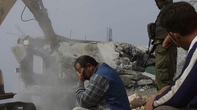
Israeli forces Wednesday handed Palestinians in Masafer Yatta, an area to the south of Hebron, notices notifying them of their intentions to demolish two residential tents and ordering them to stop the construction work on seven residential structures, according to a local activist.
Coordinator of the anti wall and settlement popular committee in southern Hebron, Rateb al-Jabour, informed WAFA that forces stormed two areas in Yatta and handed locals there notices ordering them to stop the construction work on their homes, which shelter them and their families.
The locals who received notices were identified as Ahmad, Jibril, Mahmoud, Jamil, Ali, Yasir, Khalil, and Ismail Abu Ira’am.
Forces further handed Othman Abu Qabita a notice informing him of their intentions to demolish his two residential tents, which shelter him and his family of 11 members.
Jabour condemned the Israeli practices, which he stressed, aim to make it difficult for the original Palestinian owners of the land to live there, thus forcing them out of their land for the benefit of settlements expansion.
OCHA said that, “Thousands of Palestinians throughout the occupied Palestinian territory (oPt) have been forcibly displaced or are at acute risk of forced displacement as a result of multiple factors, including policies and practices related to the ongoing military occupation and recurrent hostilities between Israel and Palestinian armed groups.”
It stressed that, “Forced displacement has a series of immediate and longer-term physical, socio-economic and psycho-social impacts on Palestinian families.”
“It deprives them of their home and land – often their main asset – and frequently results in disruption to livelihoods, a reduced standard of living and limited access to basic services. The impact on children can be particularly devastating.”
It noted that in Area C and East Jerusalem, each year hundreds of Palestinian homes and other structures are demolished due to the lack of Israeli-issued building permits. “The restrictive planning system makes it almost impossible for Palestinians to obtain permits, while providing preferential treatment for Israeli settlements.”
Most Palestinians are forced to build without a permit to meet their needs. In many cases, displacement is due to cumulative pressure created by a combination of factors, including settler violence, movement restrictions (including the Barrier) and restricted access to services and resources, said OCHA.
It said that, “Despite a decline in the number of structures demolished in 2014 compared to 2013 (601 vs. 663), the number of people displaced increased by almost 10 per cent.”
Four houses were demolished on punitive grounds in 2014 for the first time since 2005, added OCHA.
On average 64 structures were demolished in 2015 on a monthly basis in the first three months of 2015, which is higher than its equivalent figures in 2014 and 2013 (51 and 53, respectively, reported OCHA.
Coordinator of the anti wall and settlement popular committee in southern Hebron, Rateb al-Jabour, informed WAFA that forces stormed two areas in Yatta and handed locals there notices ordering them to stop the construction work on their homes, which shelter them and their families.
The locals who received notices were identified as Ahmad, Jibril, Mahmoud, Jamil, Ali, Yasir, Khalil, and Ismail Abu Ira’am.
Forces further handed Othman Abu Qabita a notice informing him of their intentions to demolish his two residential tents, which shelter him and his family of 11 members.
Jabour condemned the Israeli practices, which he stressed, aim to make it difficult for the original Palestinian owners of the land to live there, thus forcing them out of their land for the benefit of settlements expansion.
OCHA said that, “Thousands of Palestinians throughout the occupied Palestinian territory (oPt) have been forcibly displaced or are at acute risk of forced displacement as a result of multiple factors, including policies and practices related to the ongoing military occupation and recurrent hostilities between Israel and Palestinian armed groups.”
It stressed that, “Forced displacement has a series of immediate and longer-term physical, socio-economic and psycho-social impacts on Palestinian families.”
“It deprives them of their home and land – often their main asset – and frequently results in disruption to livelihoods, a reduced standard of living and limited access to basic services. The impact on children can be particularly devastating.”
It noted that in Area C and East Jerusalem, each year hundreds of Palestinian homes and other structures are demolished due to the lack of Israeli-issued building permits. “The restrictive planning system makes it almost impossible for Palestinians to obtain permits, while providing preferential treatment for Israeli settlements.”
Most Palestinians are forced to build without a permit to meet their needs. In many cases, displacement is due to cumulative pressure created by a combination of factors, including settler violence, movement restrictions (including the Barrier) and restricted access to services and resources, said OCHA.
It said that, “Despite a decline in the number of structures demolished in 2014 compared to 2013 (601 vs. 663), the number of people displaced increased by almost 10 per cent.”
Four houses were demolished on punitive grounds in 2014 for the first time since 2005, added OCHA.
On average 64 structures were demolished in 2015 on a monthly basis in the first three months of 2015, which is higher than its equivalent figures in 2014 and 2013 (51 and 53, respectively, reported OCHA.
22 july 2015

Minister of Public Works and Housing, Mufid Mohammed al-Hasayna, announced today that the reconstruction of Gaza had begun and would not be halted, stating that the next few days would see a huge effort to reconstruct the houses which were completely destroyed during the 2014 Israeli aggression on the Strip.
Al-Hasayna said in a press conference that reconstruction had begun in the flattened Sheja’iya neighbourhood of the Gaza Strip. He said: “We announce today the true reconstruction of the Gaza Strip. We will not turn from our responsibility, and we will continue our work until all homes destroyed by Israel are rebuilt”.
He stated that teams of engineers and architects in the Ministry of Public Works and Housing were working day and night with the owners of the affected homes, and that he had given orders to his staff to facilitate all services necessary and to speed up any transactions with civilians.
He thanked Saudi Arabia, Qatar, Kuwait, Jordan, Egypt and other Arab nations for their efforts to support the Palestinian people and the reconstruction project in Gaza.
Al-Hasayna commended the strength and patience of the Palestinian people and the steadfastness of the owners of destroyed houses.
Al-Hasayna said in a press conference that reconstruction had begun in the flattened Sheja’iya neighbourhood of the Gaza Strip. He said: “We announce today the true reconstruction of the Gaza Strip. We will not turn from our responsibility, and we will continue our work until all homes destroyed by Israel are rebuilt”.
He stated that teams of engineers and architects in the Ministry of Public Works and Housing were working day and night with the owners of the affected homes, and that he had given orders to his staff to facilitate all services necessary and to speed up any transactions with civilians.
He thanked Saudi Arabia, Qatar, Kuwait, Jordan, Egypt and other Arab nations for their efforts to support the Palestinian people and the reconstruction project in Gaza.
Al-Hasayna commended the strength and patience of the Palestinian people and the steadfastness of the owners of destroyed houses.
19 july 2015
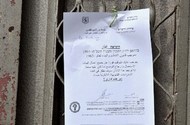
Israeli Occupation Forces (IOF) distributed notices to stop building of Palestinian houses under construction in Beit Ummar town in al-Khalil on Sunday.
The spokesman of the Popular Committee against Settlement in Beit Ummar, Mohammad Awad, said that Israeli soldiers escorted by members of Israeli Civil Administration stormed Beit Ummar on Sunday morning and distributed notices ordering three families to stop construction works of their houses.
Awad pointed out that the areas of the houses ranged between 100 and 150 square meters. One of the houses is at an early stage of construction, the second is already under construction and the third is almost finished, he added.
Awad said that Beit Ummar town has always been targeted by Israeli Occupation Forces (IOF) and Israeli Civil Administration.
He also pointed out that the owners of the houses possess official documents that allow them to work and build in their lands.
The spokesman of the Popular Committee against Settlement in Beit Ummar, Mohammad Awad, said that Israeli soldiers escorted by members of Israeli Civil Administration stormed Beit Ummar on Sunday morning and distributed notices ordering three families to stop construction works of their houses.
Awad pointed out that the areas of the houses ranged between 100 and 150 square meters. One of the houses is at an early stage of construction, the second is already under construction and the third is almost finished, he added.
Awad said that Beit Ummar town has always been targeted by Israeli Occupation Forces (IOF) and Israeli Civil Administration.
He also pointed out that the owners of the houses possess official documents that allow them to work and build in their lands.
12 july 2015
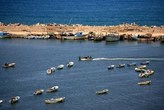
The Land of Peace for Development society on Saturday opened a seawater desalination plant in the Gaza Strip, with funding from a Turkish organization.
The desalination plant was established in al-Shati refugee camp, which is located along the Mediterranean Sea coastline in northern Gaza.
Head of the society Mohamed al-Harrazin told Anadolu news agency that the plant was created to address the problem of the highly saline underground water in Gaza and its negative impact on the lives of the population.
Harrazin added the project was funded by the Turkish organization Rabat and would help provide the Palestinian refugees in al-Shati camp with 25,000 cubic liters of fresh water every day.
The desalination plant was established in al-Shati refugee camp, which is located along the Mediterranean Sea coastline in northern Gaza.
Head of the society Mohamed al-Harrazin told Anadolu news agency that the plant was created to address the problem of the highly saline underground water in Gaza and its negative impact on the lives of the population.
Harrazin added the project was funded by the Turkish organization Rabat and would help provide the Palestinian refugees in al-Shati camp with 25,000 cubic liters of fresh water every day.
9 july 2015
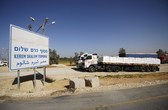
The Israeli Occupation Authorities (IOA) have decided Thursday to suspend the entry of construction materials into the Gaza Strip starting from Sunday, Palestinian official sources said.
The Israelis informed the Palestinian crossings authority of their decision to stop all permits related to the construction materials’ access into Gaza mainly cement, the sources added.
Earlier Thursday, IOA approved the entry of 46 cement trucks of more than 2,000 tons. Two hours later, the Israeli approval was canceled without providing any justification.
The decision might have been taken by a high-level political official, the source said.
Speaking to the PIC reporter, the economic analyst Mohammed Abu Giyab stated that it is clear that there is a lot of working going on behind the scenes. These complications reflect crises at the (indirect and un-revealed) negotiating process, he continued.
"We don’t know yet whether this decision will last for long period or not, but it is clear that things are complicated and interrelated," he added.
The Israelis informed the Palestinian crossings authority of their decision to stop all permits related to the construction materials’ access into Gaza mainly cement, the sources added.
Earlier Thursday, IOA approved the entry of 46 cement trucks of more than 2,000 tons. Two hours later, the Israeli approval was canceled without providing any justification.
The decision might have been taken by a high-level political official, the source said.
Speaking to the PIC reporter, the economic analyst Mohammed Abu Giyab stated that it is clear that there is a lot of working going on behind the scenes. These complications reflect crises at the (indirect and un-revealed) negotiating process, he continued.
"We don’t know yet whether this decision will last for long period or not, but it is clear that things are complicated and interrelated," he added.
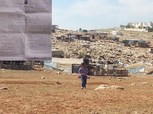
The Israeli occupation authorities notified dozens of Palestinian families of the intent to knock down homes and stop the construction of others in Jerusalem’s towns of Abu Dis and Silwan.
Head of the anti-settlement committee in Occupied Jerusalem, lawyer Bassem Bahar, said members of the Israeli civil administration, escorted by army officers, broke into the Arab al-Jahalin Bedouin community and handed the families orders to evacuate the Jerusalem Gate area in a month’s time and refer to Israeli authorities to negotiate a deportation case.
Other notifications ordered the native Palestinians to stop the construction of residential barracks pending a hearing on August 6, 2015.
Lawyer Bahar said such moves make part of a larger ethnic-cleansing scheme aimed at displacing the Bedouin communities who have set up homes of their own in eastern Occupied Jerusalem and to forcibly deport them to the dilapidated Abu Dis area, situated near a landfill.
In a related context, the Wadi Hilweh Information Center said Israeli municipal crews in Occupied Jerusalem distributed administrative demolition orders targeting a four-year-old family home, sheltering some seven civilians, and commercial structures in Silwan’s town of Ein Al-Lawza.
The targeted commercial structures include a car repair shop, covering some 50 square meters, and a three-year-old building made of tin providing livelihood for at least five families.
Head of the anti-settlement committee in Occupied Jerusalem, lawyer Bassem Bahar, said members of the Israeli civil administration, escorted by army officers, broke into the Arab al-Jahalin Bedouin community and handed the families orders to evacuate the Jerusalem Gate area in a month’s time and refer to Israeli authorities to negotiate a deportation case.
Other notifications ordered the native Palestinians to stop the construction of residential barracks pending a hearing on August 6, 2015.
Lawyer Bahar said such moves make part of a larger ethnic-cleansing scheme aimed at displacing the Bedouin communities who have set up homes of their own in eastern Occupied Jerusalem and to forcibly deport them to the dilapidated Abu Dis area, situated near a landfill.
In a related context, the Wadi Hilweh Information Center said Israeli municipal crews in Occupied Jerusalem distributed administrative demolition orders targeting a four-year-old family home, sheltering some seven civilians, and commercial structures in Silwan’s town of Ein Al-Lawza.
The targeted commercial structures include a car repair shop, covering some 50 square meters, and a three-year-old building made of tin providing livelihood for at least five families.

UN spokesman Stephane Dujarric has called anew on Israel and Egypt to open their crossings with the Gaza Strip and allow the free movement of Palestinian passengers.
Dujarric told a news conference on Wednesday in New York that the UN would continue to urge Israel and Egypt to end their blockade on Gaza and allow its residents to travel without restrictions.
The spokesman stressed that the continued closure of the crossings with Gaza was one of the reasons that led to a slowdown in the temporary Gaza reconstruction mechanism.
The Gaza reconstruction mechanism is a temporary agreement between the Palestinian Authority and Israel brokered by the UN in September 2014 and it gives Israel an assurance that building materials will not be used for other purposes.
Dujarric told a news conference on Wednesday in New York that the UN would continue to urge Israel and Egypt to end their blockade on Gaza and allow its residents to travel without restrictions.
The spokesman stressed that the continued closure of the crossings with Gaza was one of the reasons that led to a slowdown in the temporary Gaza reconstruction mechanism.
The Gaza reconstruction mechanism is a temporary agreement between the Palestinian Authority and Israel brokered by the UN in September 2014 and it gives Israel an assurance that building materials will not be used for other purposes.
25 june 2015

Minister of public works and housing Mofeed al-Hasayneh on Wednesday explained the mechanism for bringing building materials into the besieged Gaza Strip to reconstruct destroyed homes.
Hasayneh told a news conference that an all-out operation to rebuild homes destroyed totally in the last war would start in the coming days.
The minister urged the citizens whose houses sustained complete damage to swiftly process their papers at the ministry's offices in order to get licenses to rebuild their homes.
He said his ministry started to work on obtaining the Israeli approval to allow in the needed building supplies, affirming that the ministry of economy in Gaza agreed to form an oversight committee to prevent the sale and trade of construction materials.
He warned of severe action against anyone who violates the law and uses the building materials illegally.
Hasayneh told a news conference that an all-out operation to rebuild homes destroyed totally in the last war would start in the coming days.
The minister urged the citizens whose houses sustained complete damage to swiftly process their papers at the ministry's offices in order to get licenses to rebuild their homes.
He said his ministry started to work on obtaining the Israeli approval to allow in the needed building supplies, affirming that the ministry of economy in Gaza agreed to form an oversight committee to prevent the sale and trade of construction materials.
He warned of severe action against anyone who violates the law and uses the building materials illegally.
24 june 2015
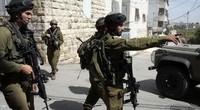
Israeli authorities yesterday handed down an order to Menizel village council, near Hebron city, to halt all building work on pipes and water tanks feeding water into the village.
Coordinator of Popular Resistence Committee, Rateb al-Jabour, told the official agency that the Israeli authorities presented member of the village council, Amad Rashid, with a notice of an order to halt the development of water pipes and tanks around the village.
Villages in the South Hebron hills are faced daily with new legislation, demolition threats and orders notifying owners that development is considered illegal by the occupying powers.
Demolition orders were delivered by Israeli officials yesterday for two tents in al-Mufaqarah village and one house, one tent and one cave in Jawwaya village, according to AIC.
Coordinator of Popular Resistence Committee, Rateb al-Jabour, told the official agency that the Israeli authorities presented member of the village council, Amad Rashid, with a notice of an order to halt the development of water pipes and tanks around the village.
Villages in the South Hebron hills are faced daily with new legislation, demolition threats and orders notifying owners that development is considered illegal by the occupying powers.
Demolition orders were delivered by Israeli officials yesterday for two tents in al-Mufaqarah village and one house, one tent and one cave in Jawwaya village, according to AIC.
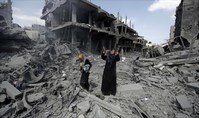
The Palestinian ministry of public works and housing said it would launch on Wednesday a project to reconstruct the homes that had been destroyed completely during Israel's last war on Gaza in 2014.
Deputy minister of public works Naji Sarhan said the ministry would hold a news conference on Wednesday to announce the start of this reconstruction project and explain the mechanisms for accomplishing that in light of Israel's restrictions on the entry of building materials.
Sarhan added in a press release that the reconstruction process in Gaza would see a significant progress and receive a major boost, affirming that the competent authorities have the funds needed for the project.
Deputy minister of public works Naji Sarhan said the ministry would hold a news conference on Wednesday to announce the start of this reconstruction project and explain the mechanisms for accomplishing that in light of Israel's restrictions on the entry of building materials.
Sarhan added in a press release that the reconstruction process in Gaza would see a significant progress and receive a major boost, affirming that the competent authorities have the funds needed for the project.
8 june 2015
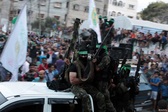
The military wing of Hamas deployed several fighters north of Gaza on Sunday to protect a construction site after the Israeli army fired at the bulldozers building a road there. According to a witness, the Israelis were targeting the heavy machinery working along the security fence, reported Quds Press.
"Shortly after the shooting," said the witness, "a number of fighters from Al-Qassam Brigades arrived in military vehicles."
Work has started recently to build a road parallel to the security fence along the eastern border of the Gaza Strip under the supervision of the military wing. Nobody from Al-Qassam Brigades has commented on or announced this officially.
"Shortly after the shooting," said the witness, "a number of fighters from Al-Qassam Brigades arrived in military vehicles."
Work has started recently to build a road parallel to the security fence along the eastern border of the Gaza Strip under the supervision of the military wing. Nobody from Al-Qassam Brigades has commented on or announced this officially.
31 may 2015
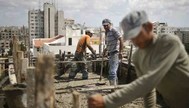
Head of the Qatari National Committee for the Reconstruction of the Gaza Strip, Ambassador Mohammed Al-Emadi, announced Saturday a number of new projects in the Strip, vowing 200 to 300 homes are to be rebuilt sometime soon.
Speaking to the press during his tour of Qatari projects in Gaza, the Qatari Ambassador said 200 to 300 families will receive building materials to rebuild their homes after they were destroyed during the Israeli offensive.
He added that talks between the Qatari committee and the Palestinian Ministry of Public Works and Housing have been underway so as to follow up on this stage of the reconstruction project.
He announced the upcoming launch a new batch of rebuilding projects as part of ongoing initiatives to restore the lodgings of thousands of homeless families in blockaded Gaza.
Al-Emadi also said final steps are being tied up to initiate the construction of 1,000 housing units as part of the one billion grant pledged by Qatar during the Cairo Conference for the Reconstruction of Gaza held last October.
He said efforts have been in progress to smooth the access of rebuilding materials into the blockaded coastal enclave.
A 51-day military offensive launched by the Israeli occupation on July 7 took away the lives of at least 2,324 Palestinians, mostly children and women, and turned thousands of civilian homes into mounds of rubble.
Speaking to the press during his tour of Qatari projects in Gaza, the Qatari Ambassador said 200 to 300 families will receive building materials to rebuild their homes after they were destroyed during the Israeli offensive.
He added that talks between the Qatari committee and the Palestinian Ministry of Public Works and Housing have been underway so as to follow up on this stage of the reconstruction project.
He announced the upcoming launch a new batch of rebuilding projects as part of ongoing initiatives to restore the lodgings of thousands of homeless families in blockaded Gaza.
Al-Emadi also said final steps are being tied up to initiate the construction of 1,000 housing units as part of the one billion grant pledged by Qatar during the Cairo Conference for the Reconstruction of Gaza held last October.
He said efforts have been in progress to smooth the access of rebuilding materials into the blockaded coastal enclave.
A 51-day military offensive launched by the Israeli occupation on July 7 took away the lives of at least 2,324 Palestinians, mostly children and women, and turned thousands of civilian homes into mounds of rubble.
26 may 2015

Palestinians of al-Jab’a village, in northern al-Khalil province, launched, on Tuesday, distress signals over the water crisis rocking the village since April due to Israel’s exploitation and mishandling of water resources.
Head of the Jab’a village council, No’man Hamdan, told a PIC journalist that the Ja’ba natives have been living in dire conditions due to Israel’s near total control over the distribution of water in the area and its refusal to distribute any water to the village for over a month’s time, leaving Palestinians with no alternative ways by which to obtain this vital resource.
He further raised alarm bells over difficulties in movement in and out of the village due to the roadblock put in place across the only passageway leading into the village by the Israeli occupation army since 2000. As such, it is impossible for vehicles of any kind to enter al-Jab’a; anyone seeking access to the village must do so on foot. Likewise, resources and furniture can only be transported into the village by having them carried on foot across the roadblock.
Al-Jab’a is a small village situated in central West Bank not far from the 1948 Green Line and is home to over 800 Palestinians. As the village is surrounded by multiple illegal Israeli settlements in the vicinity of Gush Etzion, the Palestinians of Al Jab’a must contend with an alarming amount of discrimination. This includes the confiscation of their land by the Israeli government, the destruction of their olive trees at the hands of Jewish settlers and more. Indeed, Israel’s policies towards the residents of Al Jaba are structured in such a way so as to force these Palestinians to give up and leave their homes and the surrounding area, the Palestine Solidarity project said online.
The situation has been no less tense in al-Khalil’s al-Seir neighborhood as a flock of Israeli army jeeps rolled into the area and stationed near al-Khalil’s feminist association.
The Palestinian Authority jeeps meanwhile suddenly backtracked from the area, paying no attention to the assault.
The Israeli occupation forces also notified the demolition of a family home under construction in al-Khalil’s western town of Idna under the pretext of unlicensed construction.
The Israeli occupation reportedly stepped up arbitrary demolition procedures and notifications in the southern West Bank province of al-Khalil in an attempt to crack down on the natives and force them out of their own and only homes.
Head of the Jab’a village council, No’man Hamdan, told a PIC journalist that the Ja’ba natives have been living in dire conditions due to Israel’s near total control over the distribution of water in the area and its refusal to distribute any water to the village for over a month’s time, leaving Palestinians with no alternative ways by which to obtain this vital resource.
He further raised alarm bells over difficulties in movement in and out of the village due to the roadblock put in place across the only passageway leading into the village by the Israeli occupation army since 2000. As such, it is impossible for vehicles of any kind to enter al-Jab’a; anyone seeking access to the village must do so on foot. Likewise, resources and furniture can only be transported into the village by having them carried on foot across the roadblock.
Al-Jab’a is a small village situated in central West Bank not far from the 1948 Green Line and is home to over 800 Palestinians. As the village is surrounded by multiple illegal Israeli settlements in the vicinity of Gush Etzion, the Palestinians of Al Jab’a must contend with an alarming amount of discrimination. This includes the confiscation of their land by the Israeli government, the destruction of their olive trees at the hands of Jewish settlers and more. Indeed, Israel’s policies towards the residents of Al Jaba are structured in such a way so as to force these Palestinians to give up and leave their homes and the surrounding area, the Palestine Solidarity project said online.
The situation has been no less tense in al-Khalil’s al-Seir neighborhood as a flock of Israeli army jeeps rolled into the area and stationed near al-Khalil’s feminist association.
The Palestinian Authority jeeps meanwhile suddenly backtracked from the area, paying no attention to the assault.
The Israeli occupation forces also notified the demolition of a family home under construction in al-Khalil’s western town of Idna under the pretext of unlicensed construction.
The Israeli occupation reportedly stepped up arbitrary demolition procedures and notifications in the southern West Bank province of al-Khalil in an attempt to crack down on the natives and force them out of their own and only homes.
23 may 2015
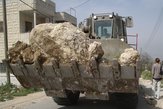
This week, the Hamas military wing started to pave a new road along
the Israeli military buffer zone along the eastern borders of the Gaza
Strip.
Farmers in the nearby areas said that they saw bulldozers owned by Al-Qassam Brigades had approached the buffer zone and started working.
"At first, a Palestinian bulldozers owned by the Palestinian housing ministry started working," a farmer from the middle area of the Gaza city said.
He continued: "The Israeli monitoring tower opened fire at the bulldozer, pushing it to retreat. A few time later, a new bulldozer escorted with two Qassam 4x4 vehicles returned to the same area and started working."
A senior Qassam source stated, "the construction of a new road along the buffer zone is underway." The source said that the read will be 300 metres far from the borders and Qassam is planning to setup monitoring towers opposite to the Israeli towers.
Since the ceasefire announced on August 26 that ended a 51-day Israeli offensive, Al-Qassam has deployed its members along the borders to prevent any Palestinians firing rockets or carrying out any offensive against the Israeli side.
However, the Israeli occupation has been breaching the truce almost everyday as it opens fire at Palestinian farmers in the east of the Strip and fishermen off the Gaza coast.
Farmers in the nearby areas said that they saw bulldozers owned by Al-Qassam Brigades had approached the buffer zone and started working.
"At first, a Palestinian bulldozers owned by the Palestinian housing ministry started working," a farmer from the middle area of the Gaza city said.
He continued: "The Israeli monitoring tower opened fire at the bulldozer, pushing it to retreat. A few time later, a new bulldozer escorted with two Qassam 4x4 vehicles returned to the same area and started working."
A senior Qassam source stated, "the construction of a new road along the buffer zone is underway." The source said that the read will be 300 metres far from the borders and Qassam is planning to setup monitoring towers opposite to the Israeli towers.
Since the ceasefire announced on August 26 that ended a 51-day Israeli offensive, Al-Qassam has deployed its members along the borders to prevent any Palestinians firing rockets or carrying out any offensive against the Israeli side.
However, the Israeli occupation has been breaching the truce almost everyday as it opens fire at Palestinian farmers in the east of the Strip and fishermen off the Gaza coast.
13 may 2015

Israeli soldiers invaded, on Wednesday at dawn, Beit Eskarya village, surrounded by the Gush Etzion settlement bloc, south of Bethlehem, handed a demolition order of a barn, and handed three families military orders to stop the construction of their homes.
Head of the Beit Eskarya village Council, Mohammad Ibrahim ‘Atallah, told the WAFA News Agency that the soldiers handed a demolition order to resident Mohammad As’ad Sa’ad, targeting his 60/square-meter barn.
The resident has seven days to file an appeal against the Israeli decision, but was not provided with any further information.
In addition, soldiers handed three residents orders to stop the construction of their homes in the village.
It is worth mentioning that the Civil Administration Office, run by the Israeli army in the West Bank, recently issued similar orders against 34 under construction homes, and structures, in the village.
The villagers filed appeals against the orders, but never received any response from the Israeli side.
On Wednesday morning, soldiers invaded Be’er al-Basha village, near Jenin, and searched the home of Abdul-Ghani Midhat, before interrogating him and his family.
The soldiers also invaded al-‘Arqa village, west of Jenin, and conducted searches in its neighborhoods.
On Tuesday evening, soldiers invaded Hebron’s Old City, and kidnapped one Palestinian, identified as ‘Emad Sa’adi at-Tarwa near the Ibrahimi Mosque.
Head of the Beit Eskarya village Council, Mohammad Ibrahim ‘Atallah, told the WAFA News Agency that the soldiers handed a demolition order to resident Mohammad As’ad Sa’ad, targeting his 60/square-meter barn.
The resident has seven days to file an appeal against the Israeli decision, but was not provided with any further information.
In addition, soldiers handed three residents orders to stop the construction of their homes in the village.
It is worth mentioning that the Civil Administration Office, run by the Israeli army in the West Bank, recently issued similar orders against 34 under construction homes, and structures, in the village.
The villagers filed appeals against the orders, but never received any response from the Israeli side.
On Wednesday morning, soldiers invaded Be’er al-Basha village, near Jenin, and searched the home of Abdul-Ghani Midhat, before interrogating him and his family.
The soldiers also invaded al-‘Arqa village, west of Jenin, and conducted searches in its neighborhoods.
On Tuesday evening, soldiers invaded Hebron’s Old City, and kidnapped one Palestinian, identified as ‘Emad Sa’adi at-Tarwa near the Ibrahimi Mosque.
5 may 2015
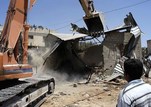
The Israeli Occupation Authorities (IOA) demolished over the past year 493 Palestinian facilities in occupied West Bank for allegedly being built without permit, an Israeli rights group said in Tuesday.
Planners for Planning Rights (Bimkom) affirmed in a press release issued Tuesday that 493 Palestinian facilities were demolished in 2014, forcibly displacing 969 Palestinians.
Meanwhile, settlement construction has notably escalated in occupied West Bank, where settlers’ number has been increasing to reach 400,000 Israelis living illegally in West Bank.
The Israeli human rights organization pointed out that the Israeli Supreme Court is considering a Palestinian appeal demanding the reactivation of local planning committees that were controlling Palestinian construction affairs before being canceled by an Israeli military order in 1971.
"The reactivation of Palestinian planning committees would solve the problem of Palestinian non-permitted construction and would put an end to Israeli demolition policy," Bimkom added.
During 2014, Israeli authorities allowed the construction of one single Palestinian home.
Planners for Planning Rights (Bimkom) affirmed in a press release issued Tuesday that 493 Palestinian facilities were demolished in 2014, forcibly displacing 969 Palestinians.
Meanwhile, settlement construction has notably escalated in occupied West Bank, where settlers’ number has been increasing to reach 400,000 Israelis living illegally in West Bank.
The Israeli human rights organization pointed out that the Israeli Supreme Court is considering a Palestinian appeal demanding the reactivation of local planning committees that were controlling Palestinian construction affairs before being canceled by an Israeli military order in 1971.
"The reactivation of Palestinian planning committees would solve the problem of Palestinian non-permitted construction and would put an end to Israeli demolition policy," Bimkom added.
During 2014, Israeli authorities allowed the construction of one single Palestinian home.
